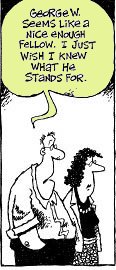
David Brooks
http://www.jewishworldreview.com --
LOOK HOW FAR the Republican party has traveled in just four years. In 1995,
the main thrust of the Republican Congress was to get government off our
backs. The Gingrichites called themselves the Leave Us Alone Coalition.
Government was the problem, and the GOP mission was to cut and devolve
federal power.
Now read the major policy speech that presidential candidate George W. Bush delivered in Indianapolis last Thursday. Bush attacked the “destructive mindset: the idea that if government would only get out of our way, all our problems would be solved. An approach with no higher goal, no nobler purpose than ‘Leave us alone.’”
Bush went on to defend limited but energetic government: “I know the reputation of our government has been tainted by scandal and cynicism. But the American government is not the enemy of the American people. At times it is wasteful and grasping. But we must correct it, not disdain it. Government must be carefully limited—but strong and active and respected within those bounds. It must act in the common good.”
Bush’s language reflects the new Republican mainstream. After the failure of the government shutdown of 1995-96, key GOP figures began backing off the prevailing libertarianism of the early Gingrich/Armey era. Senator Dan Coats put forth a series of proposals that would use government in a positive way to encourage charitable giving, to tackle social problems like divorce and illegitimacy, to help rescue neighborhoods. In that spirit, congressmen like James Talent, J.C. Watts, and Rick Santorum created the Renewal Alliance.
John Kasich, who in 1995 had issued a list of over 200 government agencies that could be eliminated, began emphasizing compassion and positive governance. Even House whip Tom DeLay has launched a touchy-feely effort he calls Shine the Light on Children in the Darkness.
Whereas the Gingrich revolutionaries were rugged individualists who put the emphasis on freedom, the post-Gingrich crowd talks about other values—compassion and community. The GOP of 1995 rebelled against authority.
The GOP of 1999 wants to restore faith in public authorities, including sections of the federal government.
 |
When I read some of Bush’s statements to Grover Norquist, the man most responsible for formulating the Leave Us Alone Coalition strategy, he insisted that the speech was “not a problem.” Whatever Bush says on the level of theory, Norquist says, Bush supports the Leave Us Alone voters on the issues they really care about. The gun people want to be left alone on guns.
The tax people want to be left alone on taxes. That’s what they vote on. Which suggests if you give these people their way on their issues, they don’t mind government’s intruding further into social policy. They are special-interest voters, not across-the-board libertarians.
Bush’s speech reflects not only a new GOP view of government, but also a new GOP view of the country. The Gingrich Republicans described a country of hard-working taxpayers who were bedeviled by a liberal elite that burdened them with workplace regulations, meddlesome environmental rules, and an intrusive nanny state. At the height of the Gingrich era, the GOP even seemed hostile to federal law-enforcement agencies. (Remember Waco and Ruby Ridge?)
The Bush speech describes a country that is essentially content, but in which certain people are being left behind. Bush wants to devote his energies to helping “children abandoned by fathers. Children captured by addiction and condemned to schools that do not teach and will not change. Young mothers without self-respect or education or the supporting love of a husband.” In other words, Bush is targeting his policies toward people who, by and large, are not Republicans and would probably never dream of voting Republican.
 |
And these are not strangers, they are citizens, Americans, our brothers and sisters.”
Specifically, Bush proposed federal grants to ministries to help mentor the 1.3 million children who have a parent in prison. He wants to help expand a program called InnerChange, run by Chuck Colson’s Prison Fellowship, which uses faith to help reform inmates in a Texas jail. He also proposed a series of tax-code changes of the sort that do not necessarily sit well with flat-tax proponents: expanding the federal charitable deduction so that non-itemizers can take advantage of it; raising the cap on corporate charitable deductions; creating a charitable state tax credit so individuals and families can get a break on state taxes; changing IRA laws so gifts can be made from retirement accounts without penalty.
This is not liberal, big government stuff. But it does represent, as the Bush press release bluntly states, “a different role for government.” Different from the role envisioned by Clinton Democrats and Gingrich Republicans. For that matter, if you look around the Republican primary field, there is not a single candidate running in the spirit of the Gingrich revolutionaries (Forbes comes closest). McCain calls for “A New Patriotic Challenge.” Dole revives Ripon Republicanism. Bauer and Buchanan want to use government each in his own way, to preserve Social Security or regulate trade.
Republicans will always be skeptical of government programs, but the
vehement
anti-government thinking that crested in 1995 is now in
David Brooks is senior editor at the Weekly Standard.
Send your comments to him by clicking here.
07/28/99: Madeleine Albright's Vendetta
07/22/99: Bill Clinton, Historian
07/20/99: The Terrorist Next Door
07/16/99: The Empress of the Empire State
